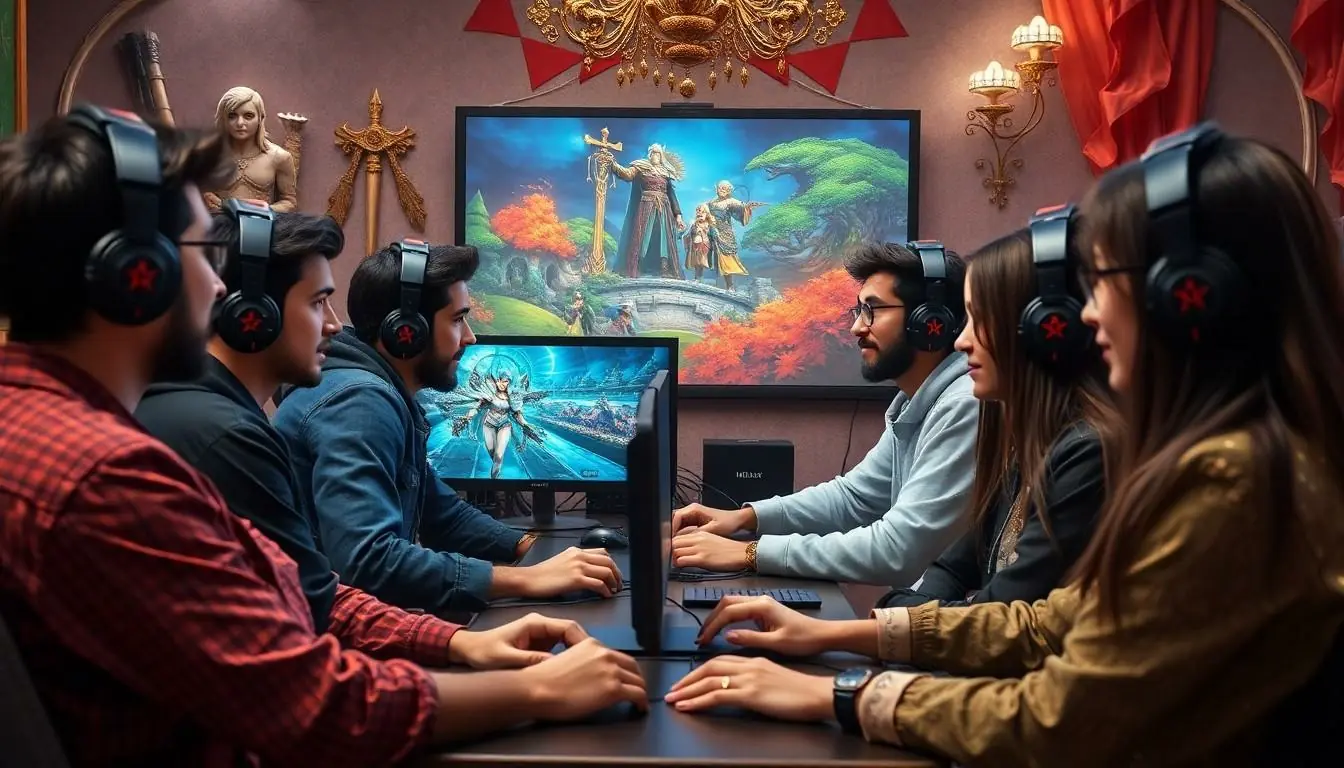In a world where dragons roam and epic battles await, the realm of MMORPGs beckons gamers to dive into adventures like no other. These massively multiplayer online role-playing games offer not just a chance to escape reality but a vibrant community where friendships are forged over virtual loot and epic quests. Whether you’re a seasoned warrior or a newbie just figuring out which end of the sword to hold, there’s something here for everyone.
Table of Contents
ToggleOverview Of Popular MMORPG
Massively multiplayer online role-playing games (MMORPGs) offer expansive worlds for players, featuring diverse genres that attract millions. Games like “World of Warcraft” set the standard with immersive storytelling and a rich lore. “Final Fantasy XIV” captures interest through its detailed graphics and emotional narratives, appealing to both veterans and newcomers.
Role-playing elements drive engagement, allowing players to create unique characters. Each character brings individuality to the game through customization options that represent the player’s style. Community interactions facilitate friendships, fostering collaboration during quests and in guilds.
Common tasks include completing quests, battling formidable bosses, and exploring vast landscapes. Players often engage in crafting, trading items, and earning rewards that enhance their gameplay. Titles such as “Guild Wars 2” and “The Elder Scrolls Online” expand the MMORPG experience by offering dynamic events and engaging PvP competitions.
Networking capabilities enhance the social aspect, connecting players globally. Communication tools enable teamwork, making it easier to strategize and conquer challenges together. Events like seasonal festivals or expansion releases create excitement, encouraging players to return for fresh content.
Integration of varied play styles caters to different preferences. Some players focus on combat, while others dive deep into storytelling or crafting. Regular updates and expansions maintain player interest, providing new content and experiences to explore.
As game mechanics evolve, so do player expectations. Engaging systems and rich narratives contribute to sustained popularity in the genre. Developers regularly prioritize player feedback, ensuring ongoing satisfaction and growth within these enchanting virtual realms.
Key Features Of MMORPGs
MMORPGs incorporate several standout features that enhance the gaming experience. Players often enjoy immersive worlds filled with endless possibilities.
Character Customization
Character customization allows for personalized avatars. Players choose unique appearances, abilities, and skills to reflect individuality. Many games like “World of Warcraft” provide extensive options for customization, including races, classes, and gear choices. Players can alter facial features, body types, and even character backstories. As personal expressions, these avatars become extensions of the players themselves. Such customization enriches community interactions and fosters deeper connections among players.
Crafting Systems
Crafting systems play a significant role in MMORPGs. Players gather resources from the environment or through quests to create items. This mechanic not only rewards exploration but also enhances gameplay depth. Items can range from weapons to potions, influencing combat and strategies. Titles like “Final Fantasy XIV” offer intricate crafting systems where players can specialize in different trades. For many, crafting becomes an integral part of the adventure, encouraging collaboration among players to share resources and items.
Dynamic Storylines
Dynamic storylines evolve based on player choices. Players’ actions can shape the game’s narrative, leading to multiple outcomes. Engaging in quests influences the world, affecting interactions and environment. Games such as “The Elder Scrolls Online” feature content that responds to community decisions, making each playthrough unique. Players also experience seasonal events with fresh storylines, keeping the narrative exciting and relevant. Through these dynamic narratives, MMORPGs invite players to invest emotionally and cultivate a deeper engagement with the game world.
Performance Analysis Of Top MMORPGs
Performance in MMORPGs significantly hinges on game graphics and user experience. Players often seek immersive visuals and smooth gameplay to enhance their adventures.
Game Graphics
High-quality graphics play a crucial role in attracting players to MMORPGs. Titles like “Final Fantasy XIV” and “Guild Wars 2” showcase stunning environments with intricate details. Graphics directly impact player engagement, as vibrant landscapes and character models enrich the fantasy experience. Advanced rendering techniques create realistic lighting effects, enhancing scenes and battles. Many players appreciate when graphic fidelity matches gameplay design, creating a seamless world to explore.
User Experience
User experience encompasses navigation, accessibility, and overall enjoyment within MMORPGs. Intuitive interfaces streamline interactions, making it easier for players to complete quests and communicate. Developers often prioritize feedback to improve controls and reduce confusion. Players benefit from tutorials that introduce game mechanics effectively, ensuring newcomers feel welcome. An engaging user experience encourages longer play sessions, fostering community connections. Popular titles routinely update features based on player suggestions, enhancing satisfaction and loyalty.
Community And Social Aspects
Social interaction stands at the core of MMORPGs, enhancing player experiences through collaboration and shared adventures. Players frequently form guilds and teams that foster a sense of belonging.
Guilds And Teams
Guilds and teams play vital roles in MMORPG communities. Players create these groups to tackle challenges together, and they often provide support and camaraderie. Members share strategies, resources, and advice, strengthening their connections. Some guilds focus on specific gameplay elements, such as PvP or raids, uniting players with similar goals. Additionally, guild members might organize events, enhancing community engagement and encouraging participation. Strong guild leadership can promote loyalty and retention, as members feel valued and empowered.
In-Game Events
In-game events serve as exciting opportunities for collaboration and competition. Developers regularly host seasonal celebrations, including festivals or tournaments, which bring players together. These events often feature unique challenges or exclusive rewards, drawing large crowds and generating buzz within the community. Players participate actively, reinforcing relationships with teammates and making new friends. Special in-game occurrences can also highlight player achievements and showcase the creativity of the community, ultimately enriching the gaming experience.
Future Trends In MMORPGs
In the evolving landscape of MMORPGs, several key trends shape the future direction of these games. Increased focus on virtual reality (VR) and augmented reality (AR) technologies offers players an immersive experience unlike any before. Enhanced graphics capabilities continue to push boundaries, resulting in stunning environments that captivate gamers.
Cross-platform play is gaining momentum, allowing players from various devices to interact seamlessly. Developers recognize the importance of accessibility, ensuring that more people can join the gaming community. Community-driven content creation emerges as a vital aspect, enabling players to contribute to game development through mods or user-generated events.
Dynamic storytelling is expected to become more prevalent, adapting to player choices in real time. This shift encourages deeper emotional connections and fosters unique narratives for each gameplay session. Collaborations between MMORPGs and popular media franchises are also on the rise, exploiting established lore and characters to engage a broader audience.
Artificial intelligence is increasingly integrated into MMORPGs, enhancing non-player character (NPC) behavior and world interactions. Enhanced NPCs can offer personalized quests or respond intelligently to player actions, enriching the gaming experience. Moreover, in-game economies are being refined through blockchain technology, enabling true ownership of items and developments.
Lastly, regular updates and expansions remain essential for sustaining player interest. As developers listen to feedback, they prioritize creating content that resonates with their community. Engaging players in the development process fosters stronger connections. MMORPGs continue to refine their offerings, ensuring they remain captivating and relevant in an ever-changing digital world.
Conclusion
The world of MMORPGs offers an unparalleled gaming experience that combines adventure and community. Players not only embark on epic quests but also forge lasting friendships in vibrant virtual realms. With an array of popular titles providing diverse gameplay and rich storytelling, there’s something for everyone.
As technology advances, MMORPGs are set to become even more immersive through VR and AR. The focus on community-driven content and dynamic storytelling will continue to engage players, ensuring these games remain a staple in the gaming landscape. With ongoing updates and innovations, the future of MMORPGs looks bright, promising even more thrilling adventures ahead.




